As a recruiter or hiring manager, identifying the right Account Executive is crucial for driving your company's sales and client relationships. Despite the importance of this role, many organizations struggle to hire an Account Executive who not only fits the job description but also aligns with the company's culture and long-term goals. Common pitfalls include underestimating the importance of sales aptitude and overlooking the required interpersonal skills.
In this article, we unpack the responsibilities of an Account Executive and outline the hiring process to ensure you select the right candidate. From crafting a compelling job description to utilizing skills assessment tools, this guide covers everything you need. Learn more about account executive interview questions to further refine your recruitment process.
Table of contents
What Does an Account Executive Do?
An Account Executive plays a key role in managing client relationships and driving sales for a company. They act as the primary point of contact between the organization and its customers, working to understand client needs and provide tailored solutions.
The day-to-day responsibilities of an Account Executive include:
- Identifying and pursuing new business opportunities
- Developing and maintaining strong client relationships
- Presenting products or services to potential clients
- Negotiating contracts and closing deals
- Collaborating with internal teams to ensure client satisfaction
- Monitoring sales targets and reporting on progress
- Staying updated on market trends and competitor activities
Account Executive Hiring Process
Hiring an Account Executive is an important task that requires a streamlined and well-organized process. The timeline generally spans 4-6 weeks, with steps designed to identify the most suitable candidate for your team.
- Craft a detailed job description: Start by creating a comprehensive job description that highlights the responsibilities and qualifications required. You can refer to Account Executive job description for guidance.
- Post on relevant platforms: Put up your job posting on platforms where your ideal candidates are likely to be. This might include professional networking sites, industry-specific boards, or your company website.
- Resume screening: Within a few days, you should receive a wave of resumes. Shortlist candidates whose experience and skills align with the role.
- Skill assessments and tests: Conduct specific skill assessments to evaluate the candidates' capabilities. Consider using tools from Adaface’s online assessment platform to streamline this process.
- Interviews: Organize initial phone interviews followed by face-to-face or video interviews with selected candidates.
- Final selection and offer: After interviews, select the top candidate and extend a job offer, negotiating terms as needed.
The hiring process is designed to identify the best talent efficiently. Throughout the process, keep communication clear and transparent with candidates. In the sections that follow, we will further explore each step with tips and resources to make your hiring process smooth and successful.
Key Skills and Qualifications for an Account Executive
When hiring an Account Executive, it's important to define the ideal candidate profile specific to your organization's needs. Many recruiters make the mistake of considering skills that may not be directly relevant to the role or industry. Understanding the distinction between required and preferred qualifications will help you identify candidates who can truly excel.
Here are the essential skills and qualifications to look for when hiring an Account Executive:
- Required Skills:
- Bachelor's degree in business, marketing, or a related field
- Minimum of three years of experience in sales or account management
- Strong communication and interpersonal skills
- Proficiency in CRM software, such as Salesforce
- Proven track record of meeting or exceeding sales targets
- Preferred Skills:
- Master's degree in a related field
- Experience in the technology or SaaS industry
- Strong negotiation and problem-solving skills
- Ability to work collaboratively in a team environment
- Experience with data analysis and reporting
| Required skills and qualifications | Preferred skills and qualifications |
|---|---|
| Bachelor's degree in business, marketing, or a related field | Master's degree in a related field |
| Minimum of three years of experience in sales or account management | Experience in the technology or SaaS industry |
| Strong communication and interpersonal skills | Strong negotiation and problem-solving skills |
| Proficiency in CRM software, such as Salesforce | Ability to work collaboratively in a team environment |
| Proven track record of meeting or exceeding sales targets | Experience with data analysis and reporting |
How to write an Account Executive job description?
Once you have a candidate profile ready, the next step is to craft the job description that will attract the right account executives. A well-written job description not only outlines responsibilities but also highlights the unique appeal of your company.
- Define key responsibilities and impact: Clearly articulate the role's responsibilities and the measurable outcomes expected. Explain how the account executive's work will drive sales growth and customer satisfaction.
- Balance technical skills with industry expertise: While listing necessary technical skills like CRM proficiency, also emphasize the importance of strong communication and negotiation abilities. Highlighting industry knowledge can also make the position more attractive to experienced candidates.
- Showcase company and role's unique selling points: Highlight what makes your company and this role special. Whether it's a dynamic team, career advancement opportunities, or innovative projects, these aspects can attract top talent. For more inspiration, refer to Account Executive job description.
10 Platforms to Hire Account Executives
Now that you have a well-crafted job description, the next step is to post it on job listing sites to find the perfect Account Executive candidates. This will help you reach a diverse pool of potential hires who can meet your business needs.
LinkedIn Jobs
Ideal for finding full-time Account Executives across various industries. LinkedIn's professional network allows for targeted searches and access to a large pool of qualified candidates.

Indeed
A comprehensive job board that aggregates listings from multiple sources. Useful for posting full-time Account Executive positions and reaching a wide audience of job seekers.

Glassdoor Jobs
Combines job listings with company reviews, making it attractive for candidates seeking full-time Account Executive roles. Useful for employers looking to showcase their company culture.
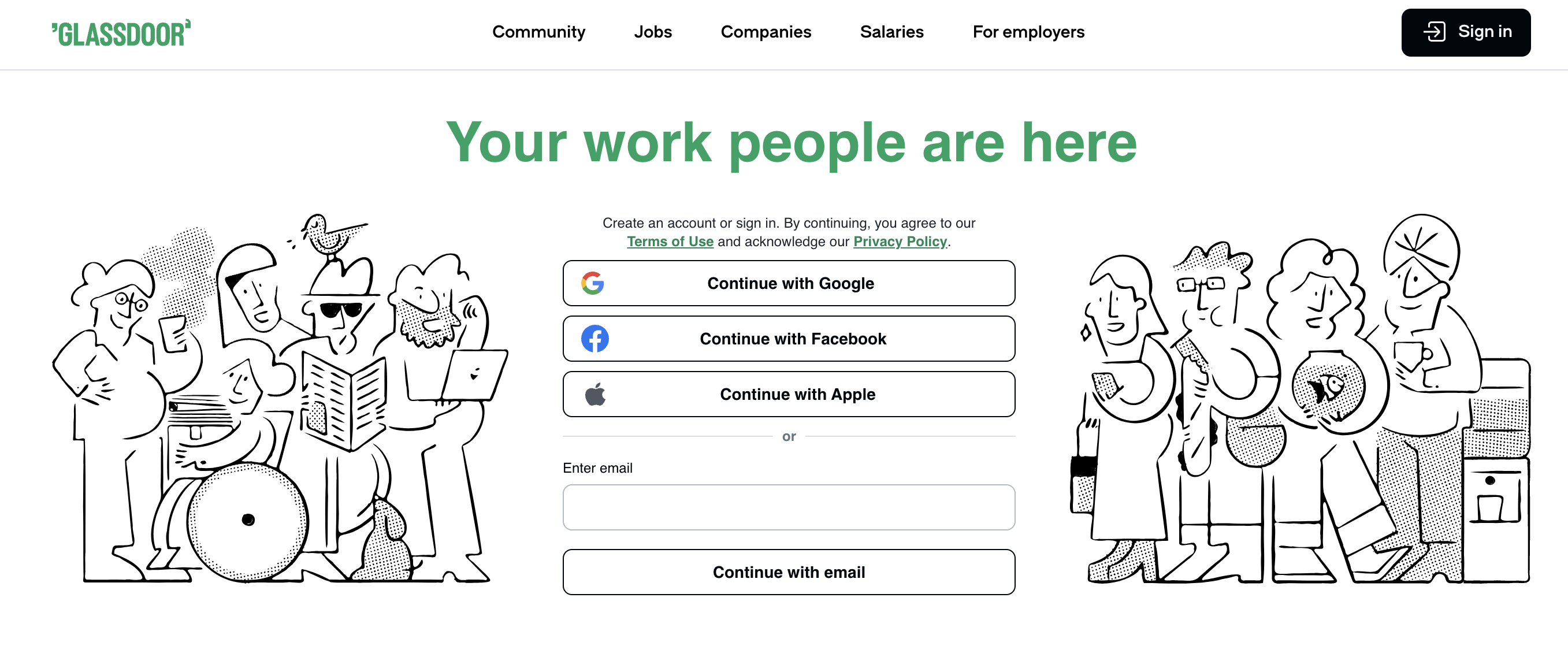
The remaining seven platforms cater to diverse hiring needs, from SalesJobs.com for sales-specific roles to AngelList Talent for startup environments. Platforms like Upwork are ideal for freelance roles, and FlexJobs focuses on remote opportunities. For tech-savvy candidates, Dice is a great choice, while CareerBuilder offers access to a wide range of candidates for full-time roles. Additionally, using robust skills assessment tools can enhance the hiring process by aligning candidate skills with job requirements.
How to screen Account Executive resumes?
Screening resumes is a key step in the hiring process for an Account Executive role. It helps recruiters quickly identify candidates who possess the necessary experience and skills, allowing them to focus on those who match the job requirements.
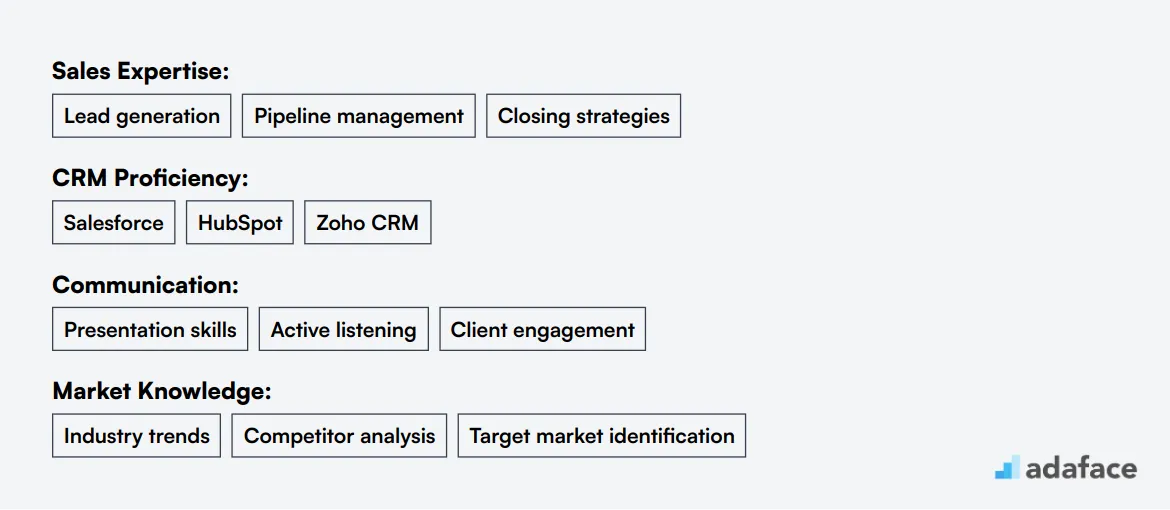
To begin, familiarize yourself with the primary and secondary keywords related to the role. Look out for terms like "sales performance," "CRM proficiency," and "market insight." The aim is not to find the perfect resume but to eliminate those that don't align with the role's core requirements, enabling you to proceed to further screening stages.
Consider using AI tools like ChatGPT or Claude for resume screening. By providing a prompt detailing the key skills and qualifications you seek, the AI can help filter resumes more effectively. This approach saves time and ensures you're focusing on the most promising candidates.
TASK: Screen resumes to match job description for Account Executive role
INPUT: Resumes
OUTPUT: For each resume, provide the following information:
- Email id
- Name
- Matching keywords
- Score (out of 10 based on keywords matched)
- Recommendation (detailed recommendation of whether to shortlist this candidate or not)
- Shortlist (Yes, No, or Maybe)
RULES:
- If unsure about a candidate's fit, mark as Maybe instead of No
- Keep recommendations concise.
KEYWORDS DATA:
- Sales (Lead generation, Pipeline management, Closing strategies)
- CRM (Salesforce, HubSpot, Zoho CRM)
- Communication (Presentation skills, Active listening, Client engagement)
- Market (Industry trends, Competitor analysis, Target market identification)
Top skills tests for assessing Account Executives
Skills tests are a great way to evaluate Account Executive candidates objectively. They help you assess key competencies needed for the role, beyond what's on a resume. Let's look at some recommended tests for screening Account Executives.
Sales Aptitude Test: This sales aptitude test evaluates a candidate's ability to understand customer needs, handle objections, and close deals. It's a must-have for assessing core sales skills in Account Executives.
Communication Test: Strong communication is key for Account Executives. A communication test assesses verbal and written skills, helping you identify candidates who can articulate value propositions clearly.
Business Development Test: Account Executives often need to identify new opportunities. The business development test evaluates strategic thinking and market analysis skills.
Problem Solving Test: Account Executives face various challenges daily. A problem solving test helps identify candidates who can think on their feet and find creative solutions.
Situational Judgment Test: This test presents real-world scenarios an Account Executive might face. It assesses decision-making skills and alignment with your company's values and approach.
Case Study Assignments for Hiring Account Executives
Case study assignments can be a great way to assess potential Account Executives because they mimic real-life challenges. However, they might pose some challenges such as being time-consuming, which can lead to lower participation rates and risk losing talented candidates. Let's explore some sample case studies that can help you make informed hiring decisions.
The Market Analysis Case Study focuses on evaluating a candidate's ability to analyze market conditions and strategize accordingly. Candidates are tasked with reviewing a hypothetical market scenario and proposing a sales strategy. This assignment helps identify analytical and strategic thinking skills, vital for an Account Executive.
In the Client Management Scenario, candidates must demonstrate how they would handle complex client relationships. This case study assesses their communication and problem-solving skills, which are crucial for maintaining long-term client partnerships. It reflects their capacity to manage client expectations effectively.
The Sales Pitch Presentation requires candidates to prepare and deliver a sales pitch for a product or service. This assignment is designed to gauge their persuasive communication and presentation skills. It's a practical way to see how they might perform in real-world sales meetings. For more insights on evaluating sales skills, explore the skills assessment tools available.
How to Structure Interview Stages for Hiring Account Executives
Once candidates pass the initial skills tests, it's time to bring them into the interview stage where their hard skills can be closely examined. Skills tests help to filter out unqualified candidates, but technical interviews are necessary for identifying the best fit for the Account Executive role. During these interviews, targeted questions can provide insight into a candidate's competence and cultural fit.
Here are some sample interview questions to consider: What strategies would you use to manage existing accounts while seeking new clients? This assesses multitasking abilities. How do you handle objections from clients? checks problem-solving skills. Can you describe a successful sales cycle you managed from start to finish? evaluates a candidate's full sales process understanding. What CRM tools are you comfortable using? gauges technical proficiency. Finally, how do you build relationships with hesitant clients? This question can highlight communication skills. For more detailed questions, check out our Account Executive Interview Questions.
Understanding the Cost to Hire an Account Executive
Hiring an Account Executive involves more than just salary; it's important to consider additional costs such as benefits, bonuses, and recruitment expenses. On average, the salary for an Account Executive in the U.S. is around $87,000 annually, but this can vary significantly based on experience, location, and company size. Overall, when budgeting for this role, factor in a total compensation package that could be 20-30% higher than the base salary to cover additional expenses.
Account Executive Salary United States
In the United States, Account Executive salaries vary based on location and experience. On average, the nationwide salary is around $87,000 per year. Salaries typically range from about $34,600 to $155,000. For instance, in New York, NY, the median is around $93,000, whereas in Cincinnati, OH, it's closer to $53,000.
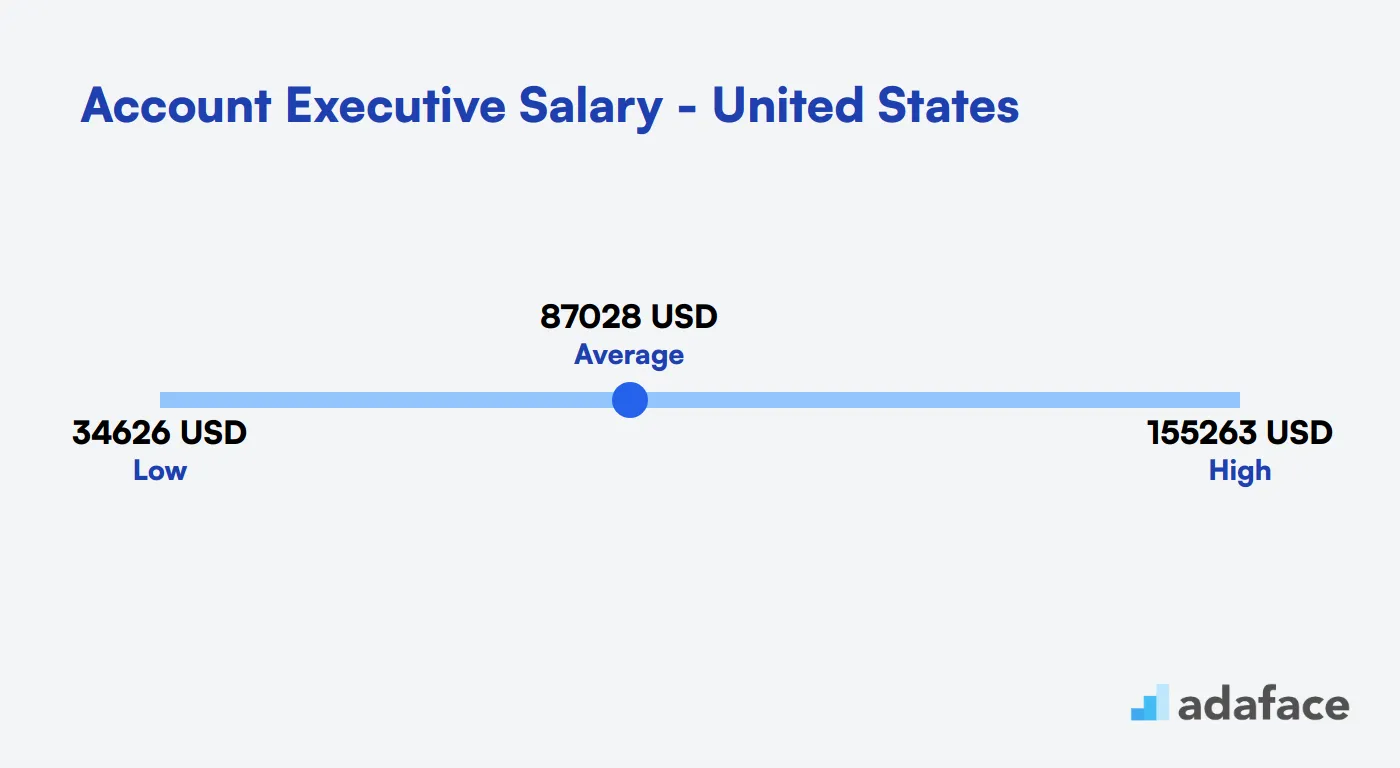
Account Executive Salary in Australia
The average salary for an Account Executive in Australia is approximately AUD 100,793. Salaries can vary significantly based on location, with ranges from AUD 51,224 in Gold Coast to AUD 152,174 in some high-demand areas. Key cities like Sydney and Melbourne show median salaries around AUD 99,262 and AUD 94,964, respectively.
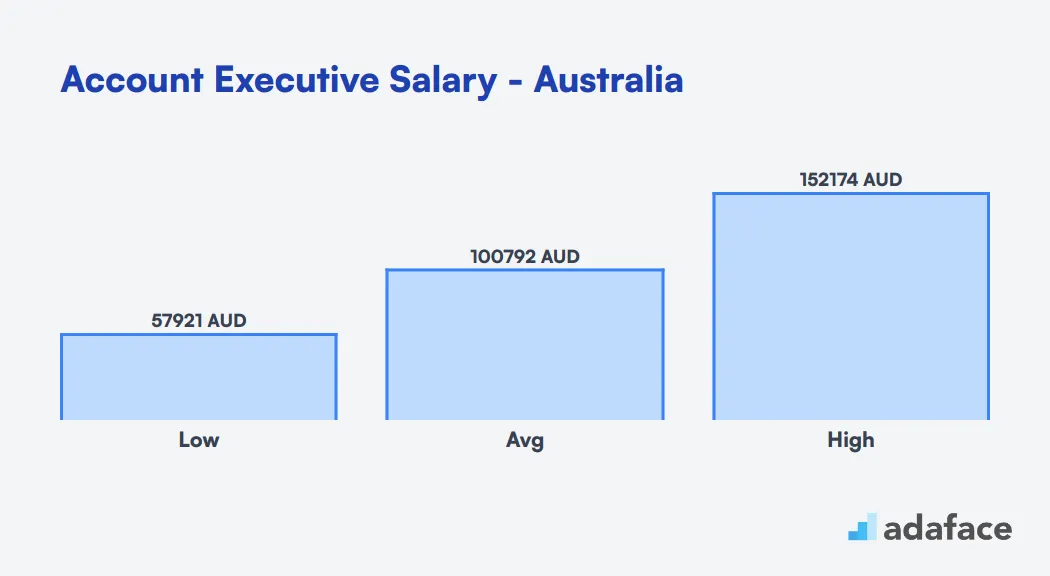
Account Executive Salary in the Philippines
In the Philippines, Account Executive salaries vary across cities. Based on recent data, the highest median salary is found in Taguig at ₱378,876 per year, while Caloocan offers the lowest at ₱273,054. The country-wide median stands at ₱723,470 annually.
Salaries in major cities like Manila and Makati range from ₱340,526 to ₱353,104 per year. These figures reflect the competitive nature of the job market in urban centers and the cost of living in these areas.
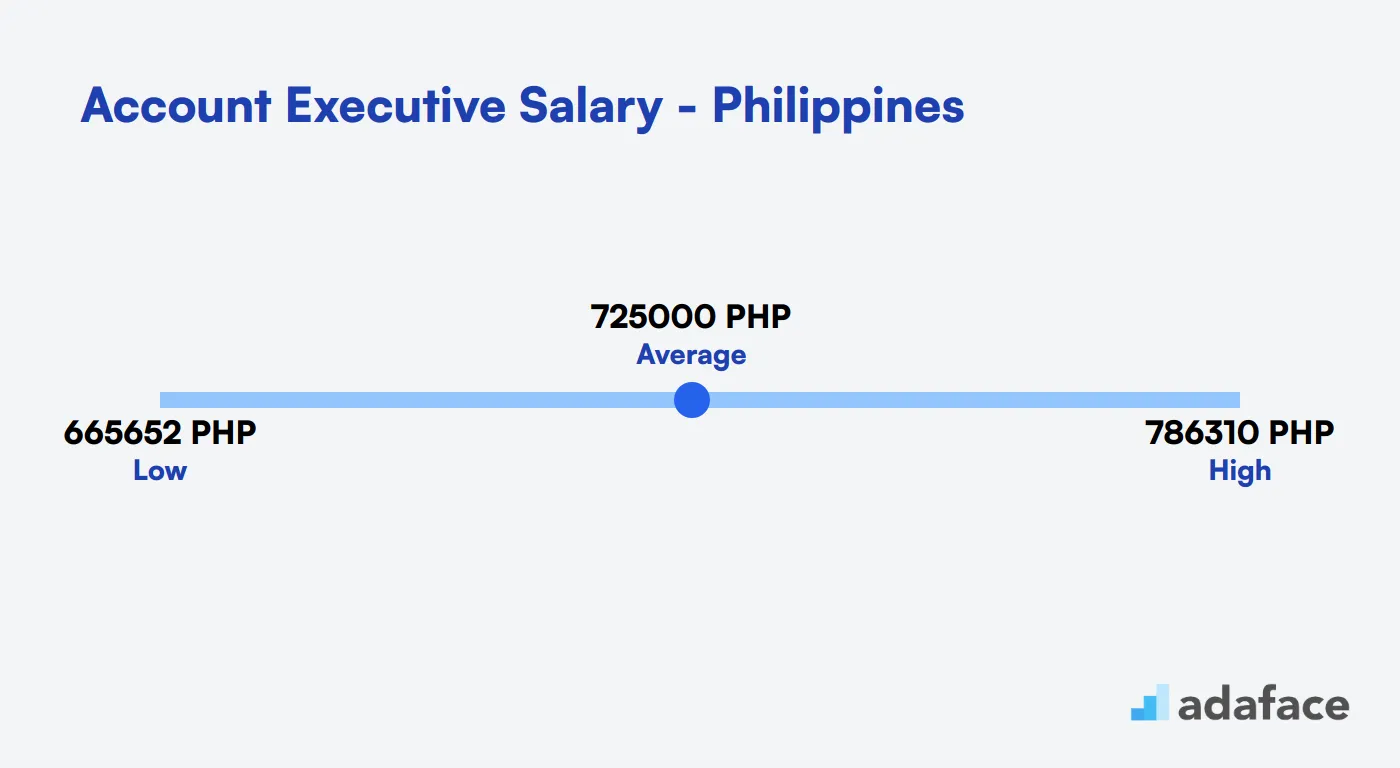
Account Executive Salary in Canada
In Canada, Account Executives can expect a median salary of CAD 70,138 per year. The salary range typically falls between CAD 40,909 and CAD 120,251, with variations based on factors like location, experience, and company size.
Among major cities, Toronto offers one of the highest median salaries at CAD 73,883, followed closely by Ottawa at CAD 74,267. Vancouver and Montreal provide competitive salaries as well, with medians around CAD 70,943 and CAD 68,112 respectively.
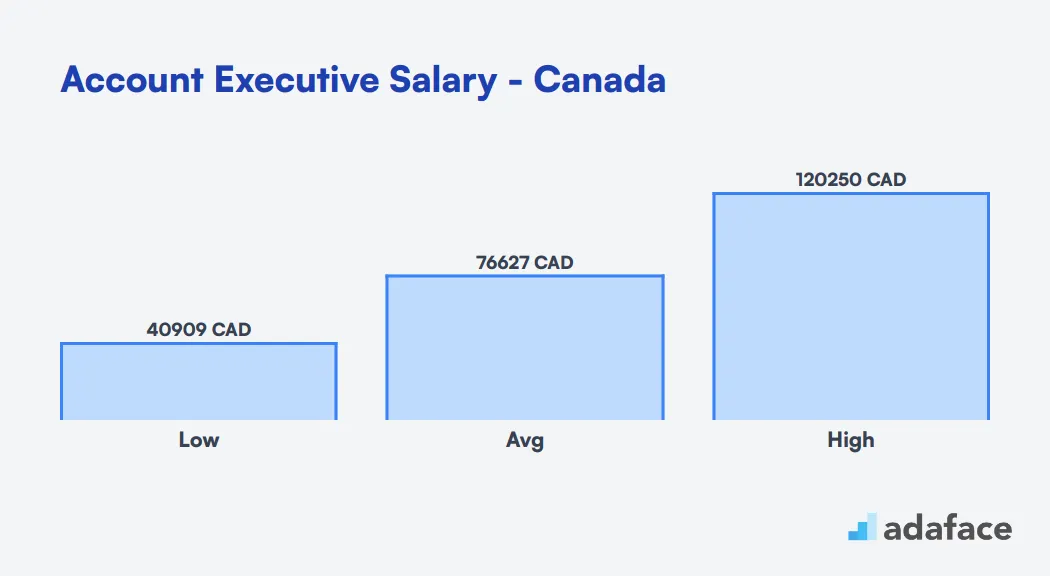
What's the difference between an Account Executive and a Sales Development Representative?
While both Account Executives and Sales Development Representatives (SDRs) play crucial roles in the sales process, people often confuse them due to their shared goal of driving revenue. However, their responsibilities and involvement in the sales cycle differ significantly.
An Account Executive primarily focuses on closing sales deals. They engage clients directly and frequently during the mid to end stages of the sales cycle. Their key skills include negotiation and relationship management, with performance measured by closed deals and revenue generated. Typically, they have several years of experience in sales, working toward revenue targets and client retention.
In contrast, a Sales Development Representative is involved in the early stages of the sales cycle, focusing on generating and qualifying leads. They establish initial contact with clients through prospecting and cold calling. Their performance is measured by the number of qualified leads and outreach activities. SDRs are often entry-level or early career professionals with the primary goal of improving lead conversion rates.
For more insights on the skills required for these roles, you can explore skills required for an account executive.
| Account Executive | Sales Development Representative | |
|---|---|---|
| Primary Focus | Close sales deals | Generate and qualify leads |
| Sales Cycle Involvement | Mid to end stages | Early stages |
| Client Interaction Level | Direct and frequent | Initial contact and outreach |
| Key Skills | Negotiation, Relationship management | Prospecting, Cold calling |
| Performance Metrics | Closed deals, Revenue generated | Number of qualified leads, Outreach activities |
| Typical Experience | Several years in sales | Entry-level or early career |
| Relationship with Clients | Build and maintain | Establish initial contact |
| Sales Target | Revenue and client retention | Lead conversion rates |
What are the ranks of Account Executives?
Account Executive positions often have different ranks and levels within organizations. These ranks typically reflect an individual's experience, skills, and performance in sales roles.
- Junior Account Executive: This entry-level position is for those new to sales or the industry. They often work on smaller accounts and learn from senior team members.
- Account Executive: The standard position focuses on managing and growing a portfolio of accounts. They are responsible for meeting sales targets and building client relationships.
- Senior Account Executive: With several years of experience, these professionals handle larger, more complex accounts. They often mentor junior team members and contribute to sales strategies.
- Key Account Executive: These specialists manage an organization's most valuable clients. They develop deep relationships and create tailored solutions for high-value accounts.
- Strategic Account Executive: At this level, executives work on the most significant accounts with company-wide impact. They often collaborate with C-suite executives to drive major business initiatives.
- Regional or National Account Executive: These roles oversee accounts across larger geographical areas, requiring a broader understanding of market dynamics and regional differences.
Hire the Right Account Executives for Your Team
In this guide, we've explored the role of an Account Executive, the hiring process, key qualifications, and even how to structure interviews. By understanding these elements, you can more effectively identify candidates who will excel in this position.
If there's one takeaway from this discussion, it's to ensure your job descriptions are clear and leverage skills tests for precision in hiring. Consider using tools like a Sales Aptitude Test to gauge a candidate's potential and fit for the role.
Sales Aptitude Test
FAQs
An Account Executive is responsible for managing client relationships, securing new business, and ensuring client satisfaction while meeting sales targets.
Clearly outline the responsibilities, required skills, and qualifications. Emphasize sales experience and interpersonal skills essential for the role. Consider using our template on how to write an Account Executive job description.
Focus on sales aptitude, communication skills, and relationship-building capabilities. Using skills tests can assist in evaluating these attributes effectively.
Utilize professional networking sites, industry-specific job boards, and recruitment agencies to source qualified candidates.
Include multiple stages such as initial screenings, skills assessments, and case study assignments to comprehensively evaluate each candidate.
An Account Executive generally manages existing client accounts and closes sales, while a Sales Development Representative focuses on lead generation and qualifying prospects.
Skills assessment platforms can evaluate candidates on sales acumen and interpersonal skills. Explore various skills assessment tools to assist in the hiring process.

40 min skill tests.
No trick questions.
Accurate shortlisting.
We make it easy for you to find the best candidates in your pipeline with a 40 min skills test.
Try for freeRelated posts
Free resources



